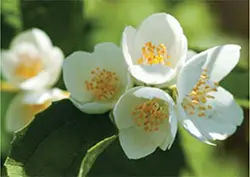
Origins of Jasmine
Jasmine essential oil is derived from the white or yellow flowers of the Jasminum genus, particularly Jasminum officinale, native to Asia. Unlike typical essential oils, Jasmine oil is an ‘absolute’, extracted using chemical solvents due to the delicate nature of the flowers. It’s relatively expensive, as it requires a significant number of flowers for production. The oil is renowned for its intense, sweet, and floral aroma.
Historical Background and Lore
Jasmine absolute is often referred to as the king of oils, with rose being the queen. Jasminum sambac, a related species, holds cultural significance in India, often used in traditions and worn in women’s hair. In Pakistan, known as chameli, Jasmine is the national flower. Jasmine tea is also a staple in Chinese culture.
Therapeutic Uses of Jasmine Essential Oil
Health Benefits
Jasmine oil is effective in alleviating cramps and mood swings related to PMS and menstruation. While it is potent and not recommended during pregnancy, it is highly beneficial during childbirth, particularly for massaging the lower abdomen. Additionally, Jasmine absolute enhances skin health, acts as an antidepressant, and is recognized as an aphrodisiac.
Personal and Spiritual Growth
Associated with feminine energy, particularly sexual vitality, Jasmine oil encourages the expression of intimate emotions and enhances sexual health. It boosts confidence and has an overall uplifting effect. During times of confusion, it helps reveal the heart’s true desires. Adding this oil to bathwater can be a stress reliever.
